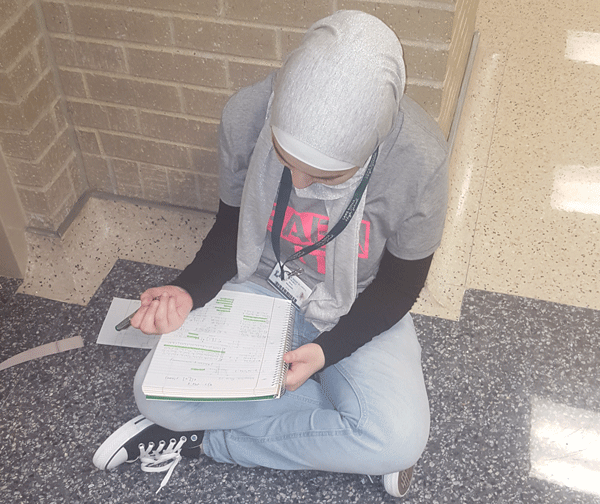What is Islamophobia?
September 15, 2016
Our generation is familiar with terms such as feminism, racism, and homophobia, but a new term, Islamophobia has entered our vocabulary. Islamophobia is described as a dislike of or prejudice against Islam or Muslims especially as a political force. According to the Washington Post, hate crimes against the Muslim population has increased more than five times since 9/11.
“People fear things that are unknown,” says Lake Ridge AP Psychology and Sociology teacher, Mr. Michael Allen.
“When we see terrorism we want to define it in some way. If we can define it, we can wrap our head around it, then we as humans tend to avoid things we can wrap our heads around,” Allen said.

Dina Albashti works before school.
Mr. Allen further explained that when we see a story on the news about a group coming out and saying they do all things in the name of Allah, the Islamic God, we immediately link the two which leads to negative thoughts towards the religion.
As a diverse community, Lake Ridge has several Muslim students enrolled at school. Dina Albashti is an eleventh grade student from Palestine. In June of this year, Dina started wearing her hijab, a headscarf worn by Muslim women to represent modesty, and when school started back up she received many reactions.
“I came to school and I remember the first week, this girl walked up to me, and she was like ‘so are you a foreign exchange student?’ I was like ‘no, I’ve been here longer than you think,’” Albashti said.
One of the clubs at Lake Ridge which celebrates its diversity is the Multicultural Club. The club is sponsored by Spanish teacher Ms. Melissa Mohler. Mohler expressed the importance of educating ourselves on the Islamic culture before judging.
“There are so many cultures around the world so it’s impossible for us to understand all the intricacies of every one, especially when it comes to religion. So since there’s things that we don’t understand, people tend to become fearful, so then they lash out and react in a certain ways because they don’t want to be injured or affected negatively themselves. It’s just a matter of educating ourselves on other religions and other cultures so we can understand and communicate with another without causing harm,” Mohler said.
However when public figures such as Donald Trump, make remarks about the Islamic religion and about wanting to construct a background check on all Muslim-Americans, it’s easy to understand why some Americans might fear Muslims. People see their leaders accusing Muslims of being dangerous so they might naturally agree.
Mr. Stephen Nicholas Perkins, president of the Republican Club at the University of Texas at Arlington, sees the problem as more terrorism related than religious.
“What Mr. Trump has been trying to find are possible solutions to a broader problem of terrorism fueled by radical religion,” said Perkins.
Ever since the tragedy on 9/11, America’s security has been upgraded to prevent any other terrorist attacks. Mr Perkins sees the progress but believes more conversations need to take place.
“While I or other Republicans may not agree with the particular details of his proposal to aggressively screen or even ban Muslims from entering the country, we do believe that a conversation about radical ideologies and their effect on the world should take place,” Perkins said.
Even though there is a great deal of news about extremists that use their Islamic religion as justification behind their barbaric actions, these extremists beliefs aren’t necessarily the shared beliefs of every Muslim according to Albashti.
“Terrorism isn’t linked to Islam because even Muslims think that the terrorist’s actions are unjust,” said Albashti.
